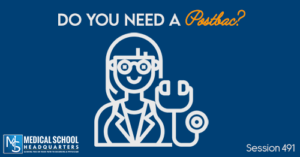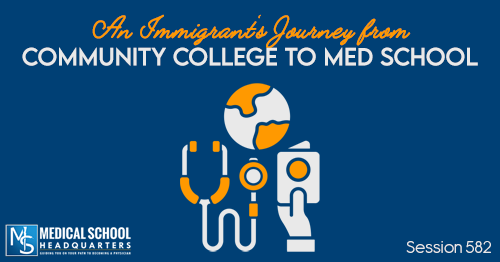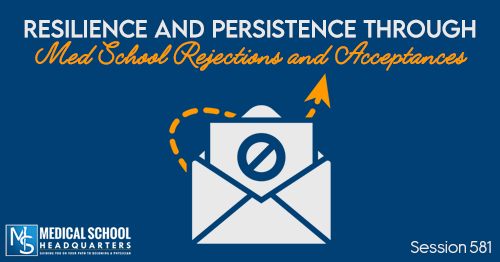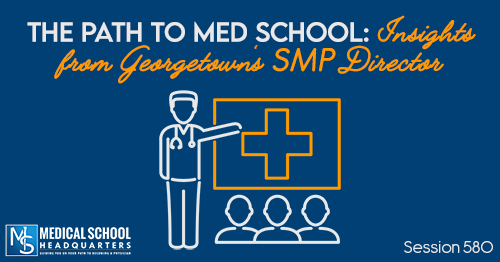Apple Podcasts | Google Podcasts
Session 491
Many students wonder if they need a postbac to boost their grades. Let’s talk about who is the best fit for a postbac journey with Dr. Joon Kim from Keck Graduate Institute.
For more podcast resources to help you with your medical school journey and beyond, check out Meded Media.
Listen to this podcast episode with the player above, or keep reading for the highlights and takeaway points.
[00:45] The MCAT Minute
The MCAT Minute is brought to you by Blueprint MCAT.
One of the biggest questions students have is knowing whether or not they should retake the MCAT or if they’re ready to take the MCAT for the first time. It’s a very hard decision. Ultimately, you’re the only one that can answer the question.
“Almost nobody feels ready to take the MCAT. But at some point, you have to take the leap and trust that the work you've done to this point is enough.”Click To TweetIf you have consistently scored well on your practice tests, then you are ready. So, make sure you’re taking those full-length exams.
Check out Blueprint MCAT and sign up for a free account to get a half-length diagnostic as well as a full-length one for free. They also have nine other full-length exams that you can check out in addition to the must-take AAMC full-length exams.
[02:51] Lifelong Learning is the Key!
Your advisors out there are continually learning just like doctors are continually learning and hopefully improving their craft.
[04:26] When to Take a Postbac or an SMP
Joon points out that right off the bat, students are making the mistake of assuming that they need a postbac or an SMP when they don’t, or thinking that they don’t need one when they do. And so, how does one know whether they need one or not?
The first potential sign that you need a postbac is when you apply and don’t get it. The end goal of those programs is to help you be successful in gaining admission into medical school, dental school, and all the different various health graduate programs.
Low GPA
There are students who will also say that their GPA is low so they need to do a postbac program. But do you really need to invest in a five-digit dollar amount to invest in a program if it’s purely just GPA?
Joon suggests going to your local community colleges. Generally speaking, some of the best teachers work at community colleges. They’re focused on teaching, not research. That’s not to say that there aren’t excellent teachers at the research institutions.
Joon adds it’s a very safe and very reasonable option for students who are looking to improve their GPA to go ahead and take classes.
[06:10] The Power of Intentionality
Now, there are a lot of people with high GPA or high MCAT scores who didn’t get in and think they need to do a postbac. It’s another common mistake among students that they’re not accurately coming to the decision of whether they even need a program or not.
A lot of students just aren’t asking questions and they’re just assuming. Or they’re getting bad advice from physicians, mentors, advisors, or even parents that they just need to do more. And then they’re not taking a pause to self-reflect on what they really need.
'Medicine has evolved. It is about personalized medicine. It's about that precision that really tailors each sort of intervention and therapy with that particular individual.'Click To TweetJoon gives this analogy of medical school application and medicine in itself which has evolved. You could prescribe the same medication to different people, and they would have different effects. In that very same way, students need to look at their own circumstances in evaluating their application, at whichever point they may be. To get started with this, Joon recommends thinking through some of your assumptions.
One of the most common assumptions students have is this imaginary timeline that you must stick to or you won’t be successful. Infants crawl at different ages, and so, it’s different for each person.
[10:56] What Kind of Curriculum to Seek Out
Joon says that if medical school is the path you want to take, you need to find a program that offers a science curriculum. It can’t be social sciences, history, or sociology. That’s not to knock the value and the importance of those important disciplines.
But whether the admission committee is confident when they see students accomplishing those courses. They want to see whether it’s a reasonable predictor of how well you’re going to do when you get to med school.
There are other courses like the applied life sciences, and then there are other courses like chemistry or engineering. Joon has also worked with students who have gotten a master’s degree in organic chemistry, for example. There are students who have had PhDs in Biology.
Again, it’s all about the evidence that one needs to convey to the admission committees that they are fully prepared and ready to be successful. And so, it has to be a science-based curriculum, whether it’s undergrad or graduate.
There are students who took the minimum science courses and they may get away with that at some med schools. Then you also have a whole sort of list of upper-division science courses that you can take. Students can find those at your local four-year institutions through either the extension office or you can be a non-degree seeking student or a visiting student.
“There are so many different options out there. But what's important is to be able to demonstrate that you can do well in those science classes.”Click To Tweet[19:28] Finding Which Program is For You!
If all you need to work on is the MCAT, seek exactly just that but a postbac. Now, an SMP is a lot more comprehensive since there are some programs where the MCAT prep is built in.
If there’s a program with between 80% success rate versus 30%, obviously, you want to consider applying to the former. You can also look at whether it’s informal or formal in terms of the schedule and courses they’re offering.
You may also choose between a cohort model or a non-cohort model. Are you taking classes just with your postbac students or are you mixed in with the general population of students? In some cases, you could be a postbac student and not see another fellow postbac student in your program because you’re not taking the same classes.
Is there a particular sort of population demographic that you have a passion and heart for? Is it kids, seniors, immigrants, or people with learning disabilities and physical disabilities? There’s got to be a specific area that is of particular interest to you.
“Be honest with yourself about what you love doing and what you’re good at. You should be decent at what you want to pursue.”Click To Tweet[24:05] Answering Rapid-Fire Yes/No Questions
Q: Should a student think about a postbac or an SMP program if they lack clinical experience?
A: No.
Q: Should a student think about an SMP or a postback program if they only lack shadowing?
A: No.
Q: Should a student think about an SMP or postbac program, if they have great grades, but a terrible MCAT score?
A: No, go find an MCAT coach.
Q: Should a student be looking at an SMP or postbac if they have clinical, have shadowing, have good grades and good MCAT scores, but lack research?
A: This depends on what type of medical school you’re applying to. Because some medical schools out there have no preference or real consideration. It’s not part of their admission process that students have research.
If your goal is to go to a more clinical, patient-facing centered medical education, then there’s no reason to seek out a postbac SMP purely just for the research opportunity. Another way that students can really get those research experiences is by looking at summer research opportunities.
For instance, the National Association for the Advisors in the Health Professions (NAAHP) has a database for summer programs and opportunities that students can use. They can find different opportunities for shadowing, clinical experience, research, and more.
Q: Should a student look at a postback or an SMP if they need letters of recommendation from science professors?
A: It depends. If you’re a traditional-aged student and you just got out of undergrad, the expectation is that you have letters from instructors. Because you’re going to go to med school, and you’re going to be a student all over again. There are students out there that actually will choose to attend SMPs and postbac programs for that very reason.
There are programs out there that guarantee a letter with their program. It sounds great on the surface. However, Joon clarifies that while they guarantee you a letter, there’s no guarantee in terms of the content. Therefore, you have to work for that.
Q: For someone interested in a specific medical school program, should someone think about a postbac or an SMP that has linkage to that program? (With typically a guaranteed interview, but maybe even a guaranteed acceptance)
A: That’s a great option, only if that medical school is your top choice because you’re putting all your eggs into that one basket. But if that is the basket you’ve always wanted since you were five years old, then it’s worth putting it in that program.
[32:38] What Can You Bring to the Table?
At the end of the day, if a student has grades that question whether or not they’re academically able to do well in medical school, then that’s when they should look at an SMP and postbac program.
Joon adds that over the past three years, he has been seeing more and more students with 3.7 GPA and 515-517 MCAT scores who are coming to their postbac program.
And so, what Joon recommends students to be thinking about is what else can they bring to the table? And when you can bring something unique that you can contribute to the overall community, it makes it much more enjoyable.
'All of you are so unique. You just need to be yourself. But unfortunately, there is this conception that this is what you need to do to be successful. It's not a recipe.'Click To Tweet[39:37] Should You Take an MCAT Before a Postbac?
There are programs out there that require an MCAT score in order to be considered for their program.
If you have a good score that you’ve already sort of taken, then certainly consider those programs that are looking for that MCAT score. You’re going to be that much advantageous in their admission process.
But for the student who doesn’t have an MCAT score, Joon cautions students against taking an MCAT so then they could apply to get into a postbac or SMP program.
There are types of postbac programs – a career-changer and an academic enhancer. Our conversation today is about the academic enhancer. So if you were a sociology, communication, or business major, with no science background whatsoever, you’re going to need to find a postbac program, that’s known as a career changer. There, you’ll be taking all the bio classes, chemistry, and so forth.
Students who are looking at academic enhancer programs are those who don’t have a very strong, particularly impressive undergraduate record. So to further jeopardize and take the risk of taking an MCAT before you’re ready to do your best is not in your best interest.
“Ask yourself if you're ready to do well on the MCAT. Because if you're not, you do not want to rush it just so you could apply to a program and get into that program.”Click To TweetIf the candidate is just solely lacking in the area of MCAT, then you don’t need a whole entire postback program, you just need MCAT prep.
[46:33] Why Consider Keck Graduate Institute
At Keck Graduate Institute, Joon says they’re an extremely small program with less than 60 postbac premed students. They focus on helping students be uncomfortable because that discomfort is how their students are going to be transformed.
They focus on more than just GPA and MCAT boost, but on helping students test and push themselves out of their comfort zone because that’s how they’re going to get better.
KGI has a very collaborative community. They work very closely together and med schools love students who know how to work well with others.
Links:
National Association for the Advisors in the Health Professions (NAAHP)












